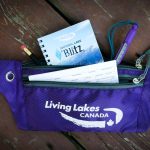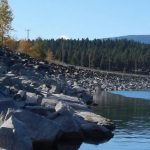Lower Columbia-Kootenay residents’ water concerns captured in new report
With dire drought conditions across most of British Columbia, the summer of 2023 is unfolding as predicted. Early, rapid snowmelt combined with a hot, dry May set the stage for what’s already declared the worst wildfire year on record in B.C. and across Canada, and we’re only halfway through the summer.
According to the provincial government’s zero to five drought level rating system, the West Kootenays have been sitting at a consistent Level 4 since early July. At Drought Level 4, negative impacts on communities and ecosystems due to dry conditions are considered “likely”. Evidence of drought is visible in increasing water restrictions, extreme fire danger, and low flows in rivers and streams (the natural inflow into Kootenay Lake from its tributaries hit a record low leading into July).
To help track these climate impacts on water, Living Lakes Canada is building a network of water and climate monitoring stations across the Columbia Basin. What’s unique about this project is the local Indigenous and non-Indigenous community feedback helping decide where monitoring stations are installed.
A series of public meetings were held in Nelson, Trail, Creston and online in early 2023 to collect and document local residents’ water concerns and priorities for the Lower Columbia-Kootenay hydrologic region, which includes the communities of Rossland, Castlegar, Salmo, and Yaqan Nuʔkiy. One-on-one consultations were also held, and a survey circulated. Feedback was provided by 111 people from a broad range of sectors and demographics.
In the Lower Columbia-Kootenay region, the two biggest demographics to participate were those who identified as water stewardship/non-profit group members (26.1%) and community members (23.4%) followed by regional government (12.6%) and the industry/private sector (7.2%).
“It was powerful to see people from so many sectors and demographics gathered together at meetings to discuss shared concerns around water,” said Paige Thurston, Program Manager for theColumbia Basin Water Monitoring Framework. ”Many of these people have been advocating for their local streams and lakes for decades and bring a considerable amount of local knowledge and expertise to this process.”
Participants had the opportunity to suggest specific streams, creeks, lakes, ponds, watersheds and aquifers they would like to see monitored. They were also invited to share their priorities for additional monitoring.
 Many water and climate concerns related to human activity (e.g. logging and development – 27.1%) and water supply (24%). For lakes and streams, participants identified drinking water, fish habitat, and agricultural impacts as the three top priorities for both water ‘quantity’ and ‘quality’ monitoring. Participants also expressed concerns about aquifer depletion, reduced supply in groundwater wells, and melting glaciers, and a strong interest in monitoring changes to snowpack and snowmelt patterns. Read the full report here.
Many water and climate concerns related to human activity (e.g. logging and development – 27.1%) and water supply (24%). For lakes and streams, participants identified drinking water, fish habitat, and agricultural impacts as the three top priorities for both water ‘quantity’ and ‘quality’ monitoring. Participants also expressed concerns about aquifer depletion, reduced supply in groundwater wells, and melting glaciers, and a strong interest in monitoring changes to snowpack and snowmelt patterns. Read the full report here.
Living Lakes Canada is developing a shortlist of sites based on the community feedback in combination with scientific parameters including the results of a data gap analysis. Those who provided feedback will have the opportunity to review the shortlist before a final selection is made and monitoring is implemented in the fall. Preliminary data from the project will be made available in 2024 through the Columbia Basin Water Hub database (www.cbwaterhub.ca).
“Our team is looking forward to continuing to work with the participants in the next phases of the project,” said Thurston.
For more information about the Columbia Basin Water Monitoring Framework project, including a full-length report on its 2022 pilot implementation in the Columbia Valley, Elk River Valley and Slocan Valley/North Kootenay Lake regions, visit www.livinglakescanada.ca/cbwmf.
Any questions can be directed at Lower Columbia-Kootenay Local Reference Group Coordinator Bill Coedy at lck.lrg@livinglakescanada.ca.





